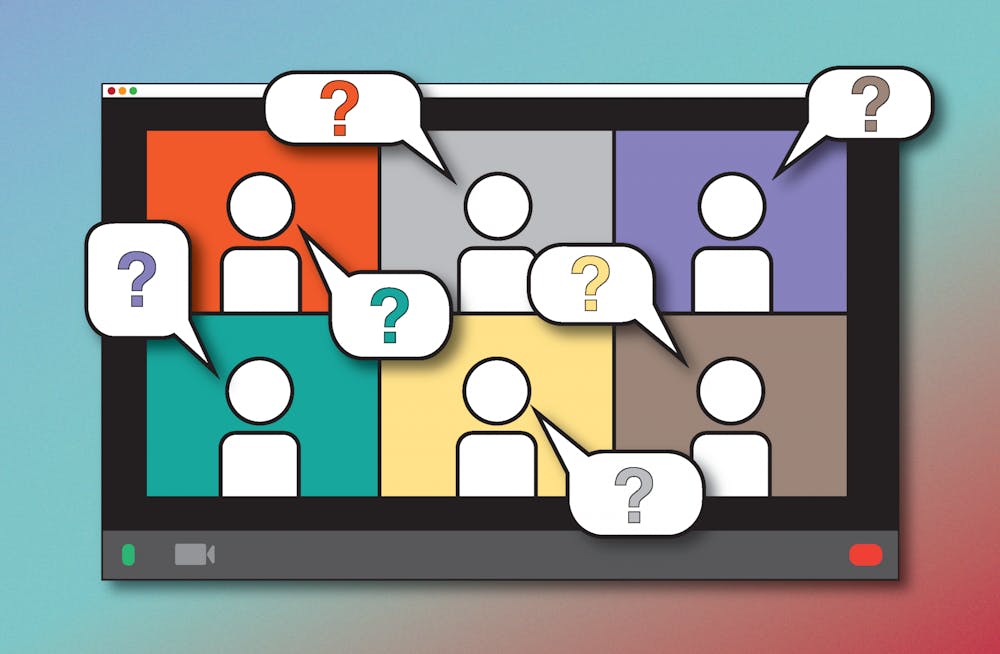Because of continued concerns about COVID-19, many students still have to deal with Zoom classes due to individuals staying home this semester. This means students still have to manage their time and studies while attending classes from their computer, an endeavor that has produced many changes in study habits.
Roman Jakubowycz is a first-year economics major. Like everyone else this semester, he has had to attend his classes through Zoom as opposed to physically meeting in a classroom.
“I’ve gotten used to it,” Jakubowycz said. “Personally, I don’t like it. However, having done it part way in high school and doing it now, I’ve gotten used to it.”
He went on to describe how online school provides a mixed bag of benefits and trade-offs.
“There are a lot a lot less moving parts — I don’t have to go somewhere to class, but there’s a personal connection between your professor and classmates that just isn’t there when you’re looking at a screen,” he said.
Emily Templeton, a first-year psychology major, concurred. She believes the online format of classes has made it easier to forget about assignments, but has made it easier to find information about them outside of class.
She also mentioned that the reduced synchronicity of classes affects her concentration.
“Not only is the class time reduced but also the amount of work is reduced. I feel like it’s really easy for me to get off task,” she said.
The problem of focusing is not unique to Templeton. The fact that online classes generally meet less frequently than they would in person has led to a greater amount of free time for students.
“I get off task more often, but this is because I simply have more free time, and it lets me get off task,” Jakubowycz said. “I feel like I’ve been doing overall worse but not so drastically worse so I’m falling apart.”
Time management can also be a problem during class as well as outside of it. Emerson Day is a junior majoring in public administration. He said online classes provide a lack of accountability that wouldn’t be present in a face-to-face environment.
“Most people aren’t dying to answer questions these days — now that you have the option to hide, it kind of inhibits learning,” Day said.
Enjoy what you're reading?
Signup for our newsletter
He elaborated by describing some of his personal experiences with Zoom classes.
“Especially at 8:30s, I’m going to turn my computer on, but I’m not going to take anything away from it. I can easily copy down slides without doing any thinking,” he said.
Day also spoke about time management on the other side of the screen —namely, the variation between the quality of online classes this fall.
“This whole online learning thing could work — and through some professors it is — but it depends on who the professor is, because ultimately they are the ones who are in charge of the online learning,” he said “Not every [professor aged 40+] is capable of doing that, there’s a little bit of a disconnect.”
While Zoom classes come with many challenges for both the students and professors, there is a way to do them right, said Dr. Jason Abbitt. Abbitt is an associate professor in educational psychology at Miami. He has been working with online teaching formats since 1998 and has led the mostly online graduate program in special education since 2005.
He succinctly described the main problem with online classes: the fact that they are online.
“Synchronous classes have a scheduled time and place, and that keeps the class in a student’s mind,” Abbitt said. “It keeps the class present in your mind, whereas with an online class that could be less present in your mind unless there’s a synchronous meeting. I have had students in online classes kind of forget that they were there — it wasn’t something that they were conscious of all the time.”
He went on to describe the hallmarks of a good online class and how having all assignments listed beforehand will help with student organization and concentration.
“Having everything built out and existing within a course can be helpful,” Abbitt said. “Online classes should have enough information so [students] can get working independently.”
Abbitt also acknowledged that most of these changes couldn’t happen with the unique conditions of this year.
“It’s not something that you would typically do overnight or over a short period of time,” Abbitt said. . “Pretty much every faculty member that I know was rapidly working over that spring break time to develop an online course and has been doing that ever since.”
This fall has been a trying time for the entire Miami community, professors and students alike. Classes are missing a vital connection between student and teacher that cannot be replicated online — they are little more than visual ghosts on a screen, if the students show up at all.
However, the decrease of class time has led to an increase in free time for students, and it’s up to them to determine how to use it.
moorese6@miamioh.edu




